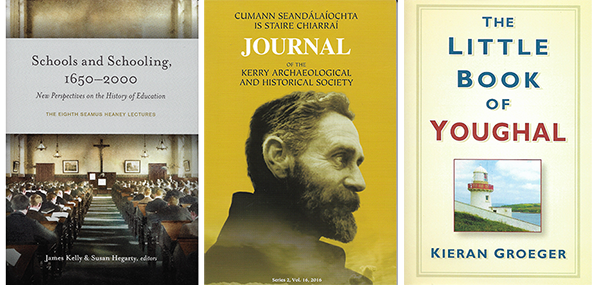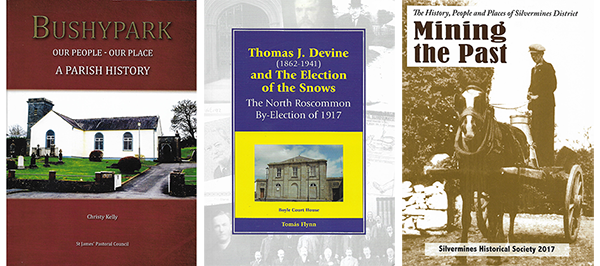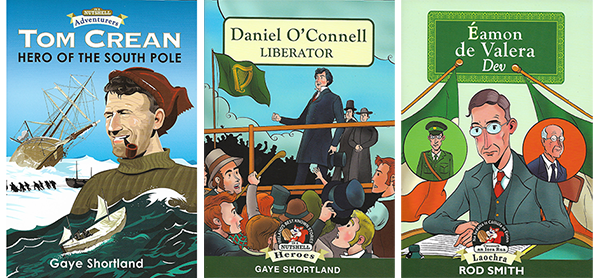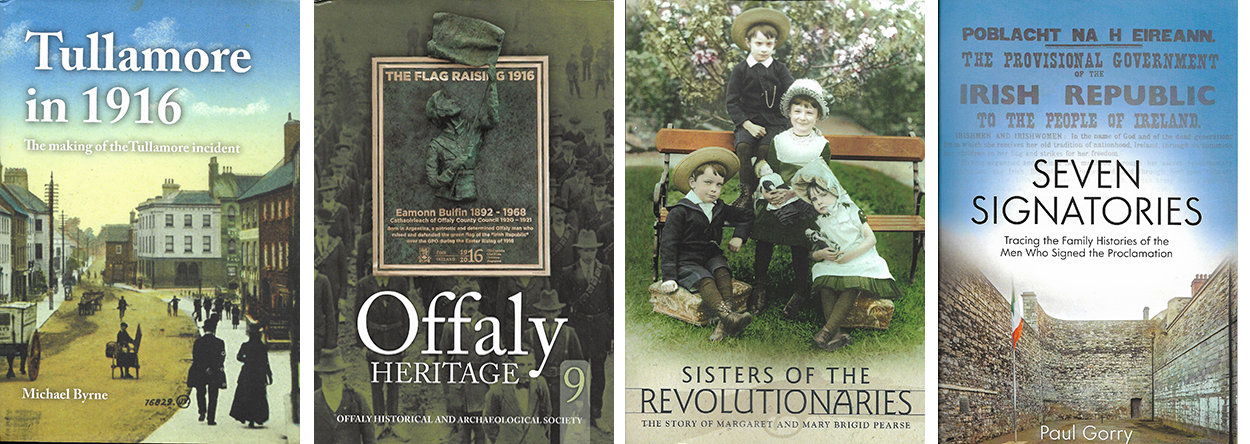BOOKWORM
Published in Book Reviews, Book Reviews, Issue 3 (May/June 2017), Reviews, Volume 25By Joe Culley
James Kelly and Susan Hegarty (eds), Schools and schooling, 1650–2000: new perspectives on the history of education (Four Courts Press, €40.50 hb, 208pp, ISBN 9781846826283).
Tony Bergin (hon. ed.), Journal of the Kerry Archaeological and Historical Society, Series 2, Vol. 16 (€10 pb, 200pp, ISBN 9780993428913).
Kieran Groeger, The little book of Youghal (The History Press Ireland, €14.99 hb, 144pp, ISBN 9781845883423).
Christy Kelly, Bushypark: our people—our place, a parish history (Bushypark Pastoral Council, €20 pb, 478pp, ISBN 9781526206213).
Tomás Flynn, Thomas J. Devine and the election of the snows: the North Roscommon by-election of 1917 (self-published, €12 pb, 102pp, available on-line).
Silvermines Historical Society, Mining the past (self-published, 170pp, ISBN 9772009955018).
Gaye Shortland and Derry Dillon, Tom Crean: hero of the South Pole (Poolbeg, €4.99 pb, 39pp, ISBN 9781781998618).
Gaye Shortland and Derry Dillon, Daniel O’Connell: liberator (Poolbeg, €4.99 pb, 39pp, ISBN 9781781998571).
Rod Smith, Derry Dillon and Máire Mhic Giolla Rua, Éamon de Valera: Dev (Poolbeg, €4.99 pb, 39pp, ISBN 9781781998564).
Michael Byrne, Tullamore in 1916: the making of the Tullamore incident (Esker Press, €19.99 hb, 276pp, ISBN 9781909822085).
Ciarán Reilly (ed.), Offaly Heritage 9 (Esker Press, €25 hb, 432pp, ISBN 9781909822061).
Teresa O’Donnell and Mary Louise O’Donnell, Sisters of the revolutionaries: the story of Margaret and Mary Brigid Pearse (Merrion Press, €14.99 pb, 112pp, ISBN 9781785371073).
Paul Gorry, Seven signatories: tracing the family histories of the men who signed the Proclamation (Merrion Press, €9.99 pb, 105pp, ISBN 9781785370991).
The eighth series of Seamus Heaney lectures, delivered at the end of 2015, have been compiled into Schools and schooling, 1650–2000: new perspectives on the history of education. Subjects tackled include the national school system and Irish in the nineteenth century, and ‘(In)equality of opportunity and educational reform’ in the 1960s, while David Fitzpatrick examines the effect of the growth in literacy on the Irish revolution. He studies the census information from 1851 to 1911 to assess how widespread formal schooling helped to develop a mental revolution. At the very least, it equipped a generation (or two) with a new, crucial set of skills:
‘Literacy, and the knowledge that it made attainable, conferred not power, but a subversive sense of entitlement to pursue power. It also conferred specific skills that could be used by political activists and organisers. These included the capacity to keep up with public events, to follow and inscribe detailed written instructions, and to compose articles, letters to the editor or topical doggerel for local papers.’
The latest Journal of the Kerry Archaeological and Historical Society includes, among some eight articles, Conor Joy’s investigations of the motives behind the killing of Arthur Vicars outside Listowel in 1921—whether he was an informer, or whether it was sectarian or agrarian—and Dáithí de Mórdha’s retelling of the folktale of the poor Blasket men who go to the aid of a stricken ship only to find themselves in a Belfast prison accused of piracy on the high seas.
Did you know that Shakespeare (probably, maybe, possibly) visited Youghal with his players? Or that Jonathan Swift (maybe) got his idea for ‘A Modest Proposal’ from a visit to the town? Or that a man could be fined £40 for deflowering the mayor’s daughter? Have you heard the tale of the pirate John Nutt? All these insights and many more snippets of fact, legend and lies can be found in Kieran Groeger’s entertaining The little book of Youghal. Dip in and out at your pleasure.

The Bushypark in Christy Kelly’s comprehensive parish history are those townlands just north of Galway town on the Moycullen road, along the western shores of the Corrib. Among the stories which may intrigue outsiders is the war of words (and more) in the 1820s between the families of Sir Valentine Blake, of Menlo Castle across the Corrib, and Anthony Martin (a half-brother of ‘Humanity Dick’) over rights of way, and the story of the 87 girls—each listed—who managed to be released from confinement in the Galway workhouse or its auxiliary in nearby Dangan and set sail for Australia at the end of the Famine.
We now move across the border into Roscommon and a study of the by-election of 1917, won, famously, by Sinn Féin-supported Count Plunkett. But who did he beat? Fr Tomás Flynn tells the tale in Thomas J. Devine and the election of the snows. Fr Flynn, a relation of T.J. Devine, delves into the local politics and characters behind the scenes. It’s a tale of what might have been: Devine, a constitutional nationalist, would likely have been elected an MP had the election been held a year earlier.
Did you know that the earliest mention of mining in Silvermines, Co. Tipperary, dates—remarkably—from 1289, when men from Genoa and Florence in northern Italy came to the area in search of, well, silver? All is revealed in Mining the past, from the Silvermines Historical Society.

From the ‘In a Nutshell’ series of children’s books from Poolbeg come the stories of Tom Crean, Daniel O’Connell and (i nGaelige) Éamon de Valera. Attractive and well told, with illustrations by Derry Dillon.

And there you were thinking that 2016 and the centenary was sooo last year … A month before the Rising there was an ‘incident’ in Tullamore. On the evening of Monday 20 March a crowd gathered to protest outside the Irish Volunteers’ hall. Things got heated, stones were thrown and windows smashed. The police arrived, and when they entered the hall to search for arms some of the men inside opened fire, injuring a number of policemen. Michael Byrne sets the scene and, more importantly, describes the local and national context that led to those events in Tullamore in 1916: the making of the Tullamore incident.
Not surprisingly, Byrne, a solicitor in the town, is also heavily involved in the Offaly Historical and Archaeological Society, which has issued Offaly Heritage 9. The large volume is primarily focused on the county’s connections to 1916.
Still on 1916, but approaching it from a fresh angle, is Sisters of the revolutionaries: the story of Margaret and Mary Brigid Pearse, who were, of course, Patrick and Willie’s siblings. Margaret was an Irish-language activist, politician and educator, who worked with Patrick in St Enda’s and took it into her hands following his execution. Mary Brigid was a musician and author of short stories and children’s fiction. Sadly, it seems, their deep affection for their brothers never extended towards each other. As the publisher says,
‘Teresa and Mary Louise O’Donnell provide a fascinating insight into the lives of Margaret and Mary Brigid, illuminating the many joys of their upbringing, their personal trials following the Rising, and the poignant disintegration of their own relationship later in life. This book reveals the previously unknown importance of the Pearse sisters’ contributions and the formidability of their characters.’
Finally, another slim but intriguing volume that takes a fresh approach to the Rising is Paul Gorry’s Seven signatories: tracing the family histories of the men who signed the Proclamation. Clarke and Connolly, of course, were born in England and Scotland, respectively, while MacDonagh and Pearse had immediate English forebears, and it’s clear that their backgrounds had some influence on their political development. Gorry has done a fierce amount of research and uncovered a great many holes in the standard biographies of the men. An interesting little read.

















